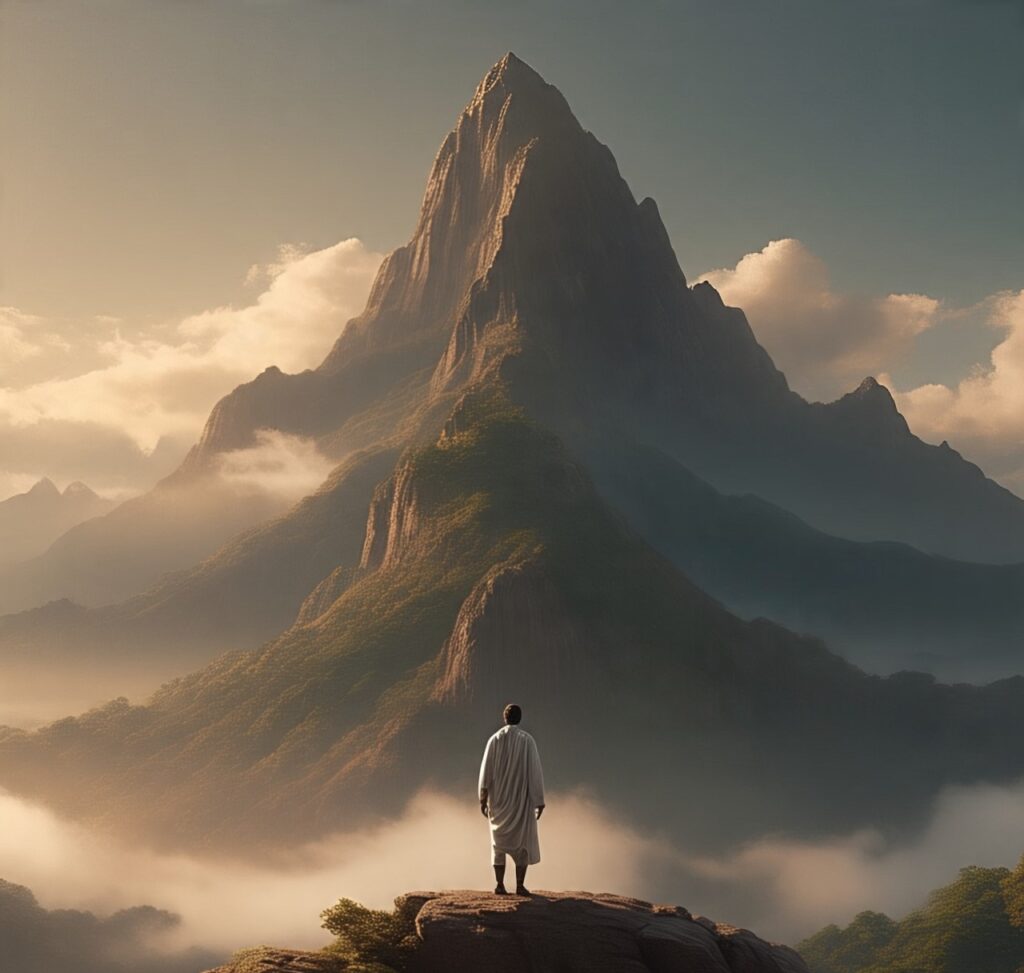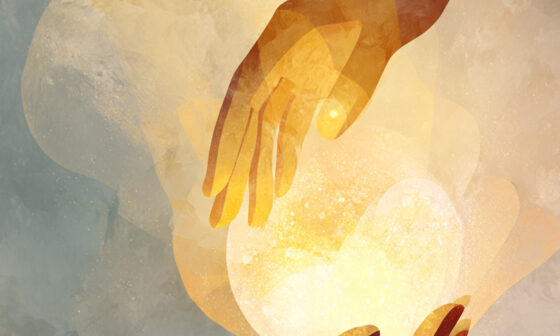Just as I posted my last article out of inspiration from an episode on the Daily Stoic Podcast by Ryan Holiday, again the inspiration continues, with another episode, I just finished listening to: Do Not Be Afraid.
My dearest reader, even if I do not know you on a personally or very personally level, I can claim that I know you love life and so do I. We love life and most of us cling to it instinctively, sometimes desperately. Life is full of beauty, joy, connection, and opportunity, but for some people just beneath that appreciation of life often comes a shadow, a fear they do not like to name, yet quietly obey: The fear of death.
This fear can be subtle; it does not always show up as panic or dread, and sometimes, it is just a quiet hesitation: A decision to stay home instead of stepping out. A choice to remain silent instead of speaking up. A path not taken, because what lies ahead is uncertain. We start calculating risks not to understand them, but to avoid them, and before we know it, we are no longer living fully. We are simply preserving ourselves.
But to fear death is to miss the point of life. The Stoics, and thinkers like Theodore Roosevelt, did not just accept mortality, they made peace with it. They believed that courage in the face of death was not just admirable; it was necessary for a meaningful life, because when we let fear rule us, we forfeit the chance to be brave, to grow, to serve, and to truly live.
With all that said, I want us to talk about what it means to live unafraid, not recklessly, but with a clarity of purpose that rises above fear, because the true danger like I published on my last article, Things Worse Than Dying, is not dying, it is existing in such a way that we never really truly live life.
The Shadow of Death: When Fear Creeps In
Life is good until we start thinking about what is on the other side. Death, for all its inevitability, remains one of the most unsettling ideas that most people face. As the podcast puts it plainly, “Life is pretty great, usually. Until you start thinking about what is on the other side.” And it is true that death introduces uncertainty, at least for some people, and this uncertainty invites fear.

That fear is not irrational because nobody wants to die, but the danger lies not in death itself, but in how that fear then goes to shape the way we go on to live. We begin to retreat from things that carry even the slightest risk. Not just physical dangers, but emotional, social, and professional ones too; we hesitate to speak up, to step out, to take the path less traveled. We exchange freedom for security and we do this very often without realizing we have made a trade at all, and in doing so, we distort the purpose of life. Death may be the end, but fear is what keeps us from even getting to the middle, heart, the very core of living well. A life spent trying not to die is not the same as a life truly lived.
The Stoics taught that while death is out of our control, how we respond to it is entirely up to us. Fear may be natural, but it is not necessary and it should never be the guide!
Fear Distorts the Value of Life
When fear of death takes the driver’s seat or even the passenger’s seat of our life, it does not just affect how we feel, it changes how we see too. We then start to evaluate life not by its depth or meaning, but by its duration. We then start to avoid anything that might shorten our time, even if that thing might have made the time richer.
Ryan Holiday on his podcast, The Daily Stoic puts it clearly: Fearing death makes us avoid things that involve risk and those are often the very things that makes life worth living for.
- A dangerous but beautiful place? We skip the trip.
- A difficult conversation to defend someone in need? We stay silent.
- A bold career move that could lead to purpose or failure? We stick with the job that slowly kills our soul but pays the bills.
In other words, fear turns us inward; it makes our safety the highest good, rather than truth, service, growth, or joy. We stop pursuing what matters and start protecting what is comfortable and we become passive consumers of safety, rather than active participants in life. But life was never meant to be lived in the shadows and as Seneca warned, we suffer more in imagination than in reality. And when fear shapes our vision, we begin to live as if dying is the worst possible outcome forgetting that wasting our life out of fear is worse still.
You see we talk about death as though it is the ultimate evil; the one fate to avoid at all costs, and so we fight it with medicine, with wealth, with denial. We idolize longevity and fear the unknown on the other side, but take a moment with me to ask: What if our obsession with staying alive is blinding us to something far more dangerous?
The Stoic philosopher Seneca didn’t see death as the worst thing that could happen; what disturbed him more was the things people were willing to do in order to avoid dying. In his writings, and as communicated in the podcast that inspired this reflection, Seneca points out how humans driven by fear and self-interest often trade their deepest values for a few more breaths: We lie, cheat, steal. We betray loved ones. We abandon what we know is right and sometimes, as the podcast states, we even sacrifice the well-being of future generations just to preserve our present comforts.
Continue Reading: Things Worse Than Dying
The Hidden Cost of Playing It Safe
At first glance, avoiding danger feels wise; it feels responsible, but beneath the surface of our cautious choices, something is quietly eroding: Meaning! Fulfillment! Impact! Every time we choose comfort over courage, we pay a hidden price, not in dollars, but in dignity.
Ryan Holiday on his podcast puts it into perspective with powerful examples: We avoid stepping into conflict to help someone, thinking, “I don’t want to get hurt.” We resist career risks, telling ourselves, “I don’t want to fail and end up with nothing.” We avoid challenges that stretch us, just to stay where we are even if where we are is slowly draining the life from us.
The real danger is not the threat of failure or harm; it is the slow, invisible shrinking of the soul. We trade our potential for predictability. We pass up adventure in exchange for artificial peace. And we call that living, but it is not. Not really, because playing it safe does not protect you from pain, it just guarantees a different kind of pain: The ache of regret.
As the Daily Stoic reminds us, we skew toward safety, not satisfaction. Yet no one looks back at a life of hiding and says, “I’m glad I didn’t try.” Courage is not about being reckless; it is about refusing to let fear make your decisions for you.
Many of us create an annual resolution for the new year at the start of each year. However, most of us don’t check all the boxes; in fact, some individuals don’t even begin. If you know this is you, good for you; you’re in no way lying to yourself at the very least. You realize that you’re in the process of making excuses, but you have the ability to improve and be more effective – Do Better, Be Better.
Continue Reading: The Pain of Discipline or The Pain of Regret?We ALL must suffer from one of two kinds of pain… that is the pain of discipline or the pain of regret. The difference between the two is that the pain of discipline weighs ounces, the pain of regret weighs tons. – Jim Rohn
Roosevelt’s Wisdom: Fit to Live, Fit to Die
Theodore Roosevelt once said, “Only those are fit to live who do not fear to die; and none are fit to die who have shrunk from the joy of life and the duty of life.” In that one statement, he captured the very heart of Stoic philosophy.
To Roosevelt and to the Stoics life is not simply about surviving; it is about stepping into challenge, living with honor, embracing responsibility, and pursuing joy without cowardice. He believed that death is part of the ride, not the end of it and certainly not something to be feared into paralysis. He warned against putting personal safety above all else, because no worthy adventure is ever completed by someone who clings to comfort.
It’s so easy to want the soft, easy version of reality, the one that doesn’t challenge us, that lets us stay right where we are, in our comfort zone, unbothered, but if you really think about it, staying in your comfort zone, and choosing comfort over truth, has a way of coming back to bite us, maybe not every time but it does come back to let use know we were wrong to do that.
One of the many things about the truth is that it has a way of demanding to be seen. It doesn’t care about our feelings, our fears, or how badly we wish something was different. But here is another thing I’ve also learnt, that when I chase, seek and stand for the truth, even when it’s uncomfortable, even when it shakes me up, that’s when I find real peace. The kind that actually lasts.
Continue Reading: Seeking And Facing The Truth Above All ElseIf you look for truth, you may find comfort in the end; if you look for comfort you will not get either comfort or truth, only soft soap and wishful thinking to begin, and in the end, despair. – C. S. Lewis
The podcast draws a clear line between fear and fitness for life; if you fear death so much that you will not really live, then what exactly are you preserving? If your love of safety keeps you from joy, meaning, and duty, then you are not living, you are just delaying.
Roosevelt’s words continue to sound what the Stoics taught centuries earlier: The brave are the only ones truly alive. not because they are unafraid, but because they refuse to let fear make them small.
To be fit to live is to walk toward what matters, even if it carries risk. To be fit to die is to leave nothing unlived, no purpose abandoned, no courage withheld.
The Mandate: Courage Over Comfort
For the Stoics, courage is not just a virtue; it is a requirement because without it, all other virtues fall apart. You cannot pursue justice if you are afraid to speak. You cannot practice wisdom if fear clouds your judgment. You cannot live with temperance if you are ruled by the fear of loss.
And so Ryan Holiday in his podcast touches this timeless truth: It is impossible to be a good Stoic without courage. And mind you, courage, in this context, does not mean recklessness, it means doing the right thing, even when it is hard; it means standing up for the truth regardless of how you feel, when your flesh would rather sit back and shrink small. It means stepping forward when everything in you says stay safe.
Courage is the foundation of a life well-lived, because without it, you settle for less challenge, less truth, less growth. You play small, you hide and in doing so, you miss out on the very things that make life worthwhile.
The Stoics did not deny danger or discomfort; they simply believed that what is right matters more, and they lived by the conviction that fear must never lead. In every choice, whether to speak, act, help, or risk, courage must have the final word.
Comfort may be tempting, but it is not where the meaningful life is found.
You could leave life right now. Let that determine what you do and say and think.
Marcus Aurelius
Not fear. But courage.
Continue Reading: The Man In The Arena: Daring GreatlyIt is not the critic who counts; not the man who points out how the strong man stumbles, or where the doer of deeds could have done them better. The credit belongs to the man who is actually in the arena, whose face is marred by dust and sweat and blood; who strives valiantly; who errs, who comes short again and again, because there is no effort without error and shortcoming; but who does actually strive to do the deeds; who knows great enthusiasms, the great devotions; who spends himself in a worthy cause; who at the best knows in the end the triumph of high achievement, and who at the worst, if he fails, at least fails while daring greatly, so that his place shall never be with those cold and timid souls who neither know victory nor defeat. – Theodore Roosevelt.
Safety First? Not Always
We are taught from a young age that “safety first” is a wise rule and in many cases, it is, but the Stoics and Ryan Holiday on his podcast challenge us to ask: What if putting safety first comes at the cost of purpose? What if it causes us to ignore a calling, turn our back on someone in need, or stay silent when speaking up would make a difference?
That is when “safety first” becomes a lie.
Of course and obviously, I am NOT suggesting that you be careless or invite unnecessary harm. As the podcast wisely says, “No one is telling you to be reckless today or to deliberately seek out potential harm.” But there is a big difference between being wise and being ruled by fear, and when your first question in any decision is “Will this hurt me?” you may already be leaving something more important behind.
Every meaningful act, whether it is defending someone, standing up for what is right, creating something bold, or simply showing up with vulnerability, carries risk.
- To love is to risk heartbreak.
- To lead is to risk criticism.
- To grow is to risk failure.
Yet none of these are reasons to hide; they are reasons to be brave.
A life spent avoiding all danger may be long, but it will not necessarily be full, and it certainly will not be free. Sometimes the most dangerous thing we can do is to never take a risk at all.
And a Christian what does the bible tell me about playing safe when it comes to doing the work for the father.
For whoever wants to save their life will lose it, but whoever loses their life for me will find it.
Matthew 16:25 NIV
Bravery as a Gift to the World
Courage is not just a personal virtue; it is a public blessing. When you choose bravery over fear, you do not just change your own life; you become a force for good in the lives of others.
Ryan Holiday on his podcast reminds me that “if you are willing to be brave and to stand up when the situation calls for it,” I will not only live more fully, I will serve more meaningfully. You see, my dearest reader; the world desperately needs:
- People who are not ruled by fear.
- People who will speak up when others are silent.
- Who will act when others freeze.
- Who will sacrifice comfort to defend the vulnerable, to create beauty, to lead with integrity.
Bravery makes the world better; it clears space for justice, for art, for progress, and it gives those watching, especially the next generation, permission to be bold as well.
So always remember this: When we put personal safety above everything, we not only limit ourselves, we also withhold the good we were meant to give. But when we dare to act courageously, especially when it is hard, we model a better way to live and to die.
The Stoics knew this. Roosevelt knew it. And so must we. Fear shrinks the soul. Courage expands it and leaves behind a legacy that outlives us all.
Read Also: Sometimes The Only Way To Win Is To NOT Play The Game
Read Also: The Road to Hell Is Paved with Good Intentions – Means What Exactly?
Read Also: The Weight of My Own Words: How I Fight To Live What I Preach
Conclusion
It is clear that fear of death is one of the most natural human feelings, but as Ryan Holiday on his podcast and the Stoics teach us, allowing that fear to govern our lives is the real danger. When fear rules, we shrink our possibilities, silence our voices, and leave the richest parts of life unexplored.
Instead, we are called to a higher way: To live boldly, courageously, and with purpose. To embrace life’s challenges as opportunities, not threats. To accept death as part of the journey not as a shadow that should darken every step we take.
Remember Roosevelt’s words: “Only those are fit to live who do not fear to die.” Living fully means risking, loving, and standing up even when it is hard. It means choosing courage over comfort and meaning over mere safety.
So do not be afraid. Fear must not be the boss of you because the true victory lies in meeting life head-on, with a brave heart and an open soul. Again and because the greatest loss is not death; it is never really living.





